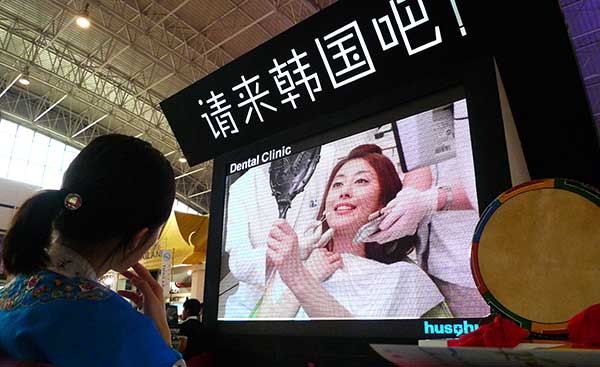More outbound Chinese are melding medical care with traditional tourism.
A visitor watches a South Korean plastic surgery promotional film at an international travel expo in Beijing.
Chen is sick.
That he knew. What he didn't know was what to do about it.
So the 72-year-old Beijinger, who prefers to give only his surname, visited two top Beijing hospitals.
He got two different responses about treating-or not treating-the chronic lymphatic leukemia he was diagnosed with in October 2013.
So, he traveled to Japan the next February. He needed a definite diagnosis.
And wanted to enjoy himself a bit.
"One (Chinese hospital) told me to wait since there were no symptoms. Another gave me pills."
The Japanese hospital also told him to wait until he was symptomatic. The doctor extensively explained the disease's development-something he appreciated since he'd only had brief sessions with Chinese doctors.
"The (Japanese) doctor was patient and reasonable," he says.
The process lasted over an hour.
It only cost about $85 for everything, including bone-marrow tests.
Chen and his wife also shopped in Tokyo's Ginza district, which he says helped take his mind off his anxieties about his illness.
More Chinese mainlanders are heading overseas to meld medical purposes with fun.
(While Chen has a terminal disease, most are generally healthy yet get advanced checkups while spending most of their time exploring the countries the hospitals are in.)
They visit Japan for diagnoses,
the United States for cancer treatments and
the United Kingdom for liver transplants-visiting landmarks, shopping and participating in luxury-leisure activities along the way, explains Robin Wang, a marketing officer with Beijing-based outbound-medical-tourism operator Hope Noah.
Japan's proximity and advanced healthcare has made it a popular destination for Chinese medical tourists. The country began offering medical visas in 2010 and local travel agencies began developing routes integrating hospital visits with attractions and shopping three years later.
The number of Chinese who visit the country for medical checks annually is expected to surpass 310,000 by 2020, and market value may reach $4.6 billion, a Development Bank of Japan report says.
Beijing Huihong International Travel Service took about 300 Chinese to Japan in 2015, a 30 percent year-on-year increase.
Most didn't have health problems but wanted checkups because of concerns about stress, pollution and food safety, general manager Huang Xujie says.
Many get genetic tests to determine their predispositions to diseases.
"The yuan's rise and trust in Japan's medical care have fueled the craze," Huang says.
The company's trips usually last about 10 days-two of which are earmarked for health exams-and cost 20,000-60,000 yuan ($3,260-$9,100).
"(China's) medical equipment may be as good, but service is a common complaint," Huang says.
Different doctors see different results from the same X-rays, he explains.
His company only works with Japan's public hospitals, which receive about five Chinese patients a day.
Many Chinese hire travel agencies to arrange medical visas, appointments, flights and hotels.
While specialized companies, such as Beijing Saint Lucia Hospital and L'avion, have traditionally specialized in China's outbound medical tourism market, more conventional travel companies are expanding their presence, especially in the past two years.
Caissa and China CYTS Tours offer medical-tourism packages to countries like Switzerland and South Korea.
Beijing Utour International Travel Service in 2014 launched Magic Travel, which offers superrich health-conscious Chinese high-end medical services.
Several customers last year booked its 588,000 yuan stem-cell-injection treatment package, replete with five-star hotels and a helicopter sightseeing experience.
Magic Travel's six-day US tour for checkups at the University Medical Center of Princeton costs up to 200,000 yuan and includes Statue of Liberty and Wall Street visits.
"Most of our customers are senior management," the company's product manager, Wang Mingying, says.
Medical tourism was highlighted in a June report on luxury travel by China's Hurun Research Institute, which tracks trends among China's extremely wealthy.
Roughly 60 percent of survey's respondents have taken medical tours and prefer overseas hospitals.
More middle-class customers are also getting interested, which experts predict will soon make medical tours under 100,000 yuan very popular.
Medical tourism around the globe is projected to account for 16 percent of tourism revenue at $678.5 billion by 2017, an SRI International report predicts.
A healthy chunk of whatever the future figures are will likely come from China.
